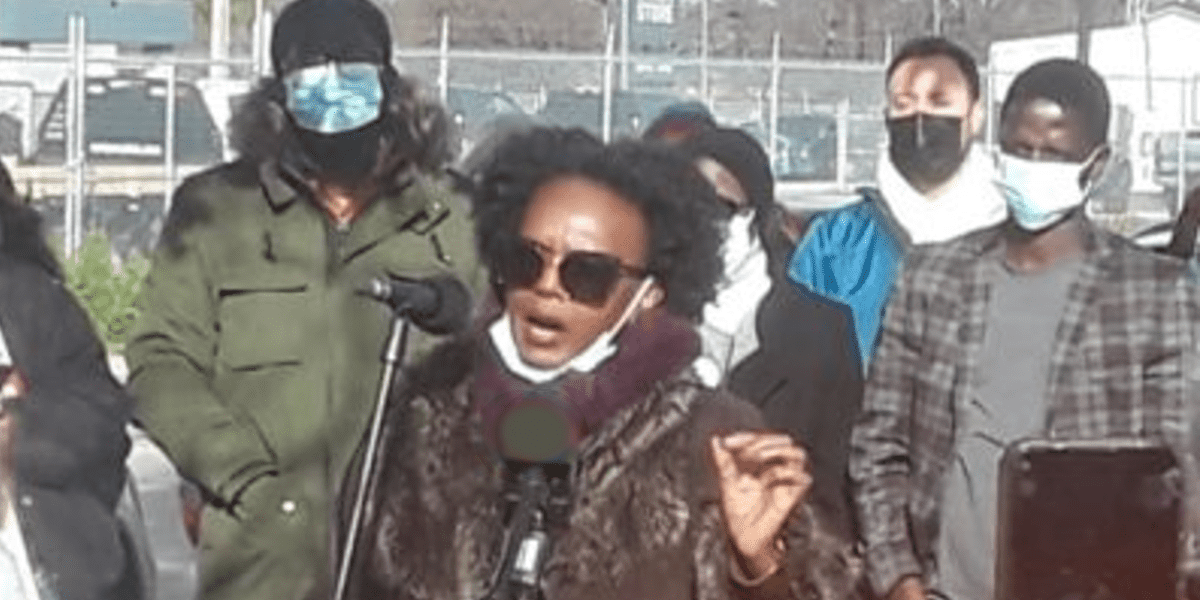Hamilton’s Black leaders issue calls to action to ‘build trust’ after arrests of housing activists
Published December 1, 2021 at 2:22 pm

Leaders from the Black community in Hamilton are making three calls to action following last week’s arrests of six housing activists.
At a press conference on Wednesday, a series of speakers called on Hamilton Police Service to drop all charges against the six people who were arrested either at J.C. Beemer Park on Nov. 24, or outside of the Central Police Station on Nov. 26. The second and third calls are for a judicial inquiry into the conduct of all Hamilton police officers who were present in both instances, as well as end to encampment teardowns that are taking place in the city, in spite of an admitted shortage of shelter spaces.
The first arrests came within two days of HPS Chief Frank Bergen holding a meeting entitled, Rebuilding Trust With The Black Community. Bergen has reached out through email to Black leaders, who say they are formulating a response.
“If you want to build trust with the Black community, you have to demonstrate good faith, and right now, we are not seeing that,” said Evelyn Myrie, who is president of the Hamilton Afro-Canadian Caribbean Association (ACCA), the city’s oldest Black community group.
“We were shocked to see the swiftness of charges being laid against these individuals, these young people whom we have taught to get involved, to make change.
“You want to build trust, here’s an opportunity to show you are serious, honest and transparent in this regard,” Myrie added. “We can address this by dropping all of these charges. The young people who have been charged, they are taking considerable risk to help unhoused people in our community.”
Five of the six activists who were arrested and face various charges of assaulting and obstructing police officers are Black. The Ontario Special Investigations Unit, the provincial police watchdog, has opened an investigation into the serious injury that one of the activists, a Black woman with a disability, suffered outside of the Central police station.
Lack of housing ‘not a police issue’
For many racialized Hamiltonians, the arrests on Friday evoked the May 2020 police killing of George Floyd in Minneapolis, that galvanized the Black Lives Matter movement. Another major concern that was conveyed is whether Hamilton’s affordable housing shortage — there’s a waitlist of some 6,500 families to find a place — should even be a police matter.
“One video showed a police officer’s knee on the neck of a young Black woman,” said Ruth Rodney of the ACCA. “These videos were frightening, but more than that, these traumatizing images brought many of us back to that painful summer of 2020, when Derek Chauvin killed George Floyd while pressing his knee against George Floyd’s neck.
“We believe the criminalization of social activism criticizing unmet shelter needs is counter-productive,” Rodney added. “We must resist the urge to criminalize Black youth … Pursuing criminal charges will serve no purpose other than to do long-term harm.”
The amount of social housing stock in Ontario has basically remained the same for close to 30 years, under Conservative and Liberal leadership at both senior levels of government.
“The encampment crisis is a symptom and concrete manifestation of a larger social policy failure at different levels of government resulting in an inadequate housing supply for lower-income people and a lack of shelter space,” Rodney said.
Kojo Damptey, executive director of the Hamilton Centre for Civic Inclusion, noted that the same activists who are facing charges are offering shelter this week to Talal Abdulwahid. Abdulwahid, 48, lost nearly all of his possessions and keepsakes when an explosion and fire razed the encampment in Beemer Park last week.
One reason for calling for a judicial inquiry, Damptey added, was that the activists’ constitutional rights might have been breached.
“They have the right to assemble peacefully under Section 2(c) of the Canadian Charter of Rights and Freedoms,” he said.
Leo Johnson, founder of the Empowerment Squared charity, added that there is a “beautiful opportunity” to find a way to “trouble-shoot” Hamilton’s affordable housing crisis. He also expressed dismay at the police tactics.
“We expect that police should be standing in solidarity, calling on all levels of government, letting them know this is not a police issue.
“Charges should not have been laid,” added Johnson. “Why was there the haste? We saw the knee on the neck. Can we not use any other means of engagement? Is that the only way we can train our police force?”
A GoFundMe campaign in support of the activists’ legal expenses has already surpassed its $30,000 goal. At this writing, it has garnered $30,471 from nearly 500 supporters.
A court injunction in 2020 led to Hamilton pausing teardowns of encampments, where unhoused people live under tarpaulins and tents on municipal property. The teardowns resumed after a city council vote on Aug. 9, and an attempt to win a new injunction has failed.
Ward 3 City Councillor Nrinder Nann has said she will push for a “human rights-centred” approach to end encampments at the first opportunity.
The Shelter Health Network, a group of health-care professionals that includes doctors, midwives, nurse practitioners and registered nurses that works with social service organizations, is also calling for the city to pause encampment teardowns.
” We urge Council to find other ways of addressing the crisis of homelessness in this community,” says a SHN statement that was sent to the city’s emergency and community services committee.
insauga's Editorial Standards and Policies advertising





